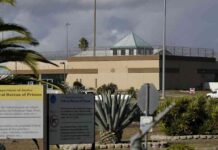The Metropolitan Police Department in Las Vegas has been facing scrutiny for restricting independent journalists’ access to information and crime scenes, sparking concerns about potential violations of the First Amendment. Freelance reporters like Doug Roberts and videographer Ben Fama Jr. have been vocal about Metro’s actions, which they believe hinder their ability to cover important news events and maintain transparency in police operations.
Challenges for Independent Journalists
Doug Roberts, an independent journalist based in Las Vegas, has shared his frustrations about being excluded from press briefings and denied access to the department’s media email list by Metro. Similarly, Ben Fama Jr., a videographer with Law&Crime Network, has encountered difficulties in gaining entry to crime scenes and has been told that he does not qualify as a member of the media by Metro officials. These restrictions have raised concerns among independent journalists and organizations like the ACLU.
Legal Concerns and Criticism
According to Jacob Smith, a staff attorney for the ACLU of Nevada, Metro’s actions infringe upon the First Amendment rights of journalists, as the government should not have the authority to determine who qualifies as press. The ACLU and the Reporters Committee for Freedom of the Press have been critical of Metro’s policies, urging Sheriff Kevin McMahill to provide equal access for all journalists. Jennifer Nelson, a senior staff attorney for the Reporters Committee, highlighted the importance of ensuring that both traditional and non-traditional journalists have the same rights and access to information.
Lack of Response from Metro
Despite calls for transparency and equal treatment of journalists, Metro has yet to respond to the concerns raised by independent reporters and advocacy groups. The Las Vegas Review-Journal’s request for an interview with Sheriff McMahill was declined by Metro, citing his unavailability. In a statement, the department emphasized the importance of protecting the media’s constitutional rights but did not address the specific allegations of restricting independent journalists’ access.
Media Credentials and Access
Metro’s practice of limiting access to crime scenes and press events based on traditional definitions of who counts as a journalist has drawn criticism from legal experts and media organizations. The department’s insistence on questioning journalists about their affiliation and credentials has been seen as a barrier to independent reporters and freelancers who may not fit the traditional mold of media outlets. The Reporters Committee emphasized the need for recognizing the evolving media landscape and ensuring that all journalists have equal access to information.
Challenges Faced by Independent Journalists
Ben Fama Jr. shared his experience of being denied access to a police shooting scene despite showing his credentials, with the officer stating that only “recognized media” were allowed. The encounter became tense, highlighting the difficulties faced by independent journalists in covering critical events. Doug Roberts also faced similar challenges when trying to participate in a police briefing, indicating a pattern of exclusion faced by non-traditional media outlets and reporters.
Legal Battles and Advocacy Efforts
In response to Metro’s restrictions, independent journalists like Doug Roberts have sought legal recourse, threatening litigation and seeking support from organizations like the ACLU. Despite these efforts, Metro has defended its actions, citing state laws related to media credentials and access to criminal information. The lack of clarity and consistency in Metro’s policies has raised concerns about the department’s commitment to upholding the First Amendment rights of all journalists.
Impact on Media Landscape
The restrictions imposed by Metro on independent journalists have broader implications for the media landscape in Las Vegas and beyond. By limiting access to information and crime scenes, Metro risks creating a one-sided narrative and excluding valuable perspectives from non-traditional media outlets. The lack of transparency and accountability in how Metro determines media access has sparked debates about the role of law enforcement in shaping public discourse and media coverage.
Calls for Transparency and Accountability
As the debate over media access and freedom of the press continues, advocacy groups like the ACLU and the Reporters Committee have emphasized the importance of upholding the First Amendment rights of all journalists. By urging Metro to reconsider its policies and provide equal access to information, these organizations seek to ensure that independent reporters can fulfill their role in informing the public and holding authorities accountable.
Conclusion
The restrictions placed on independent journalists by the Metropolitan Police Department in Las Vegas have raised serious concerns about freedom of the press and transparency in law enforcement operations. By limiting access to information and crime scenes, Metro risks undermining the vital role that independent journalists play in covering critical events and holding authorities accountable. As calls for equal access and transparency continue to grow, it is essential for Metro to reevaluate its policies and uphold the constitutional rights of all journalists, regardless of their affiliation or status. Only by fostering a diverse and inclusive media landscape can we ensure that the public remains informed and empowered to engage with issues that impact their communities.






















